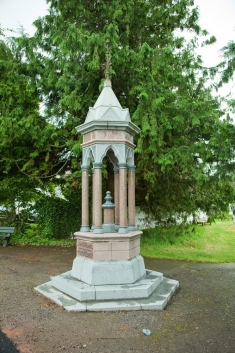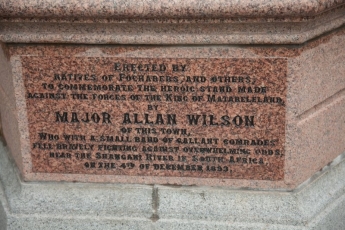Michael Caine may have successfully defended Rorke’s Drift against the Zulu army but the truth of the Zulu War turns out to be slightly different from the Hollywood version. Duncan Harley examines a slice of Scottish history commemorated by a Fochabers fountain.
Over the years, I have often driven past this Morayshire fountain, never thinking to stop and read the inscription. Today I took a wee look and discovered that it is a tribute to Major Allan Wilson, late bank clerk of Fochabers.
Lord Chelmsford had famously invaded Zululand without the knowledge of the UK government in the hope that he could capture Cetshwayo, the Zulu king, before London discovered that hostilities had begun.
Things however did not go smoothly, and this monument is a link to those events.
The fountain erected in memory of Major Wilson was commissioned by the Duke of Richmond and Gordon and is inscribed:
Erected by the natives of Fochabers to commemorate the heroic stand made against the forces of the King of Matebeleland by Major Allan Wilson of this town who with a small band of comrades fell bravely fighting against overwhelming odds near the Shangani River in South Africa on the 4th of December 1893.
Allan Wilson (1856-1893) was born in Glen Urquhart, Ross-shire, and is best known for his leadership of the Shangani Patrol during which he met his death, making him a national hero in Rhodesia.
On completion of his bank apprenticeship in Fochabers, he went to the Cape Colony and joined the Cape Mounted Rifles. He fought in the Zulu War and the First Boer War and was promoted to Sergeant. After taking his discharge he became a trader and gold prospector and earned a commission in the Basuto Police.
Later, he joined the Bechuanaland Exploration Company as Chief Inspector and was sent as their representative to Fort Victoria (now Masvingo) in Matabeleland, serving as the senior officer in the Victoria Volunteers. He became a Major and was killed while leading the Shangani Patrol during the First Matabele War.
Wilson is buried, along with most of his patrol and with Cecil Rhodes, in Matabo Hills, Zimbabwe.
When the First Matabele War broke out in 1893, Wilson was given command of the Victoria Column and appointed to the rank of Major. He led the Shangani Patrol in search of King Lobengula and on 4 December, he and thirty one of his men were cut off from the main column and killed by the Ndebele warriors.
In desperation, and only hours before his death, Wilson sent Frederick Russell Burnham and two other scouts to seek reinforcements from the main column commanded by Major Patrick Forbes.
Unfortunately, the battle raging there was just as intense and there was no hope of anyone reaching Wilson in time.
The incident achieved a lasting, prominent place in Rhodesian colonial history and is considered to be the British equivalent to Custer’s Last Stand.
A patriotic play, Wilson’s Last Stand, was written and it ran in London for just over two years. In the play, it was claimed that in killing Wilson and his men, Lobengula lost eighty of his royal guard and another 500 Ndebele warriors. Wilson seemingly, was the last to fall and the wounded men of the Shangani Patrol loaded rifles and passed them to him during the final stages of the defence.
When their ammunition ran out, the remaining men of the Patrol are said to have risen and sung, God Save the Queen. Once both of Wilson’s arms were broken and he could no longer shoot, he stepped from behind a barricade of dead horses, walked toward the Ndebele, and was stabbed with a spear by a young warrior.
The truth may have been slightly different, but that’s show business for you, I suppose!
- Comments enabled – see comments box below. Note, all comments will be moderated.


I think the people in Fochabers must be imbeciles to build a fountain in commemoration to a mass murderer.
[Slight edit to clarify opinion based nature of comment – Moderator ]
Ah see what you’re sayin’ Sean, and empathise to an extent, and at least agree that it’s ower bonny a fountain to commemorate such an ugly set of events.
In present times it is commonly known and understood that the Anglo-Zulu war was unnecessary and brutal, endorsed by Queen Victoria and driven by the deliberately perpetuated belief that Zulus were inferior, but malicious and dangerous beings.
However at the time of building the memorial, and before we could get our info via a couple of kewords and a google search, general public opinion was shaped by what news came out of Africa intact, and what of that was deemed fit for distribution by the powers that be ( or rather, were ).
In view of this, I find your comment about the people of Fochabers a bit harsh, particularly as only a tiny empowered and privileged minority would have been party to the decision, and would have been similarly influenced by approved accounts of events.
It is good that different feelings and opinions are allowed to comment in Aberdeen Voice, and I am grateful (and wiser) for your comment Fred. I made my comment after reading the article, and the article made me feel angry.
The British Empire invaded and occupied many countries that the Empire had absolutely no right to and this was done in a very cruel, self-righteous and merciless manner. Hundreds of thousands of indigenous peoples died (perhaps even millions), while Britain pillaged and those in charge became the richest in the world.
When I watch the news broadcasts from former occupied countries such as Nigeria and Zimbabwe, I can’t help but think that their problems and suffering started because of Britain. If I was Prime Minister I would quadruple the overseas budget and that can be paid for by taxing all the millionaires and billionaires at eighty per cent, (which would also sort out Britain’s poverty).
I see where you are coming from Sean but I don’t agree. For a start, in those days of “Empire” the common people were the underdogs. To get ahead you had to be part of the establishment. Wilson worked as a bank clerk then saw a way out. LIke many before and after, he went off to war, little realising the folly. The great lie, the old lie and the fibs we were all brought up with. Dulce et decorum est pro patria mores.
Its a story, a good tale and that’s all Sean. As to the funding of the fountain I suspect it was by subscription. There are many like it in Moray.
I really take issue on one point though. The use of the insulting term “imbecile”. Its not healthy to insult folk.
Its rude and its insulting not only to the people of Fochabers, but to us Scots. We are better than this. We can see the other point of view. We are strong because of this.
There is room for informed and indeed passionate debate and that is why I write for the Voice and indeed many other papers. But insulting the people of Fochabers is a step too far.
I am happy to discuss further.
Sean, Zimbabwe is in fact where this slice of colonial history took place. Wilson is buried next to Cecil Rhodes.Rhodesia was the precurser to Zim.
May I just point out that Glen Urquhart is in Inverness-shire and not Ross-shire.
Perhaps there are more than one Glen Urquhart’s Ruth. Happy to corrected if I am in error though.
The Roll of Honour for the Shangani Patrol reads:
MAJOR ALLAN WILSON:
Born 1856 in Glen Urquhart, Co. Ross, Scotland.
Son of Robert Wilson.
Educated: Kirkwall Grammar School, Orkney, and Milnes’ Institution, Fochabers, Co. Moray.
Emigrated to South Africa, 1878.
Came to Mashonaland in 1892.
More at http://www.newrhodesian.net/viewtopic.php?f=30&t=2929
Scottish writer Isabella Fyvie Mayo (1843-1914), who lived in Aberdeen, had views on the subject of memorials and statues:
‘‘Of late years, since the multiplication of “monuments” and “memorials” has become the fashion, Scotland has erected many to the honour of Royalties and of Scotsmen who have taken prominent part in spreading English dominancy over the world, whether by force of arms or statecraft. But she has not much remembered those sons of hers who have wrought for all human kind or for herself.” [The Young Man, 1901]
Mrs Fyvie Mayo instanced the abolitionist Rev. James Ramsay (1733-1789), an Aberdeen graduate whose writings had inspired Wilberforce but who, she believed, had no memorial. And she supported the idea of honouring Aberdonian William Alexander, author of Johnny Gibb of Gushetneuk, complaining that “his sole memorial had been thrust into a graveyard of sordid associations.” She may not have known that Nelson actively defended slavery but she commented that he “was on the side of the tyrants against the peoples” and that “after his death a great deal of Russian Imperial money went into the foolish column on which he now stands (as an honest Jack-tar remarked) mast-headed.” [being sent up to the mast-head was a punishment] And she referenced the involvement of Scots in imperialism in her objection to a memorial to John Wilson of Fochabers according to the press report of a talk she gave in 1894:
“in Tasmania the native had vanished before the barbarity of the white race, and in Matebeleland there had been another object lesson supplied. A monument was to be erected at Fochabers in memory of Major Wilson’s party; it was to be hoped the inscription would record that these men suffered through the treachery of two scoundrels of their own race.” [‘Aberdeen Journal’]
Not surprisingly, the resulting memorial fountain, commissioned by the Duke of Richmond and Gordon did not include any such comment in its inscription.